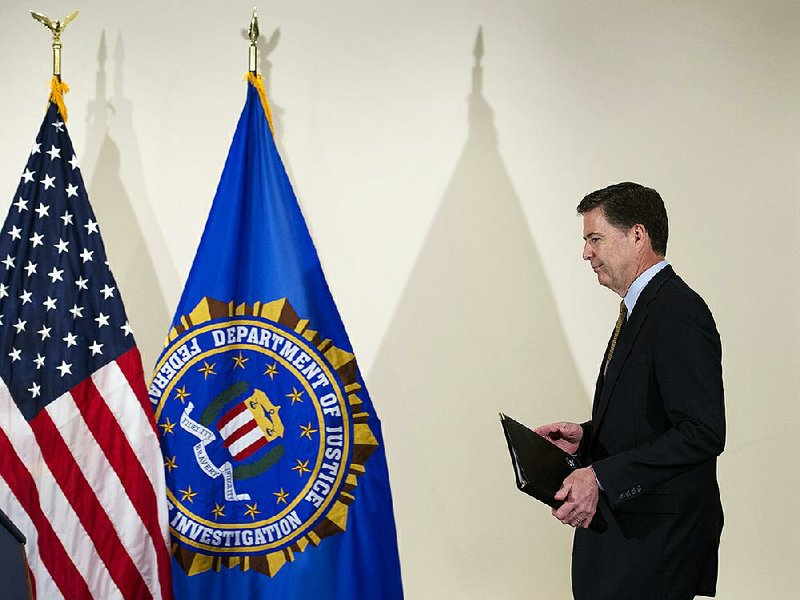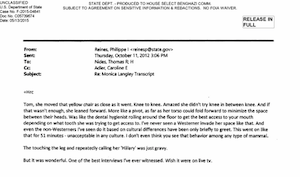WASHINGTON -- The FBI won't recommend criminal charges against Hillary Clinton for her use of a private email server while she was secretary of state, agency Director James Comey said Tuesday.
RELATED ARTICLES
http://www.arkansas…">Obama, Clinton hit trail http://www.arkansas…">State Department slow to produce Clinton records
FULL ELECTION COVERAGE
He called her actions "extremely careless" and faulted the agency she led for a lackadaisical approach to handling classified material, but said in his 15-minute announcement that "no charges are appropriate in this case."
Comey's decision removes the threat of criminal charges in the emails case. Attorney General Loretta Lynch said last week that she would accept the recommendations of the FBI director and of career prosecutors.
Comey criticized Clinton's actions, saying the FBI found that 110 emails that were sent or received on Clinton's server contained classified information. He added that it was possible that people hostile to the U.S. had gained access to her personal email account.
"Although we did not find clear evidence that Secretary Clinton or her colleagues intended to violate laws governing the handling of classified information, there is evidence that they were extremely careless in their handling of very sensitive, highly classified information," he said.
"There is evidence to support a conclusion that any reasonable person in Secretary Clinton's position ... should have known that an unclassified system was no place" for sensitive conversations, Comey said.
Comey, a Republican former federal prosecutor, also broadly criticized the handling of classified information on unclassified email systems at the State Department, saying investigators found evidence that the "security culture" there was "generally lacking in the kind of care for classified information" at other government agencies.
State Department spokesman John Kirby said, "We don't share that assessment." But he added that the department is "always looking for ways to improve."
Comey contradicted Clinton's past assertions that she had turned over all of her emails for when she was secretary of state and that she had never sent or received any emails that were classified at the time. The FBI chief said that in the course of the investigation, 110 emails in 52 email chains were determined to contain classified information at the time they were sent or received. He also found that "several thousand work-related emails" were not among the group of 30,000 emails Clinton turned over in 2014.
Yet after criticizing Clinton, her aides and the department for their actions, he said that after looking at similar circumstances in past inquiries, the FBI believed that "no reasonable prosecutor would bring such a case."
Comey made the announcement just three days after the FBI interviewed Clinton in a final step of its yearlong investigation into the possible mishandling of classified information.
He said he shared the FBI's findings with no one else in the government before making his announcement, which came just hours before Clinton traveled with President Barack Obama on Air Force One to campaign together for the first time this year. Neither Obama nor Clinton addressed the issue during their North Carolina rally.
White House officials said Obama did not know about Comey's recommendation ahead of time.
The White House declined to comment on the FBI's announcement. But press secretary Josh Earnest said, "Based on what we know from Director Comey's comments, they've looked at this in excruciating detail."
Obama, he said, remained "enthusiastic" about Clinton's candidacy.
A spokesman for the U.S. attorney's office in the Eastern District of Virginia, whose prosecutors are involved in the case, declined to comment. A Justice Department spokesman said she was preparing a possible response.
Comey, who did not take questions, defended the bureau's work.
"Only facts matter, and the FBI found them here in an entirely apolitical and professional way," Comey said.
GOP criticism
Clinton campaign spokesman Brian Fallon said the campaign was pleased with the decision but reiterated that it was a "mistake" for Clinton to use personal email while she was secretary.
"We are pleased that the career officials handling this case have determined that no further action by the department is appropriate," Fallon said. "As the secretary has long said, it was a mistake to use her personal email and she would not do it again. We are glad that this matter is now resolved."
Republicans seized on Comey's criticism of Clinton, which they said raised questions about her fitness to hold high office.
Republican presidential candidate Donald Trump has called for criminal charges against Clinton. He has continued to make the server a campaign issue and suggested that Clinton was helped by a Democratic administration. After Comey's announcement, Trump tweeted: "The system is rigged. ... Very very unfair! As usual, bad judgment."
Trump also asserted that former U.S. Gen. and former CIA Director David H. Petraeus, who pleaded guilty to a misdemeanor charge of mishandling classified information, "got in trouble for far less." Petraeus was accused of turning over highly classified information to a woman with whom he was having an affair.
House Speaker Paul Ryan, R-Wis., said in a statement that Comey's announcement "defies explanation" and that not prosecuting Clinton would set a "terrible precedent."
"While I respect the professionals at the FBI, this announcement defies explanation," he said in a Twitter post. "No one should be above the law."
Other congressional Republicans immediately called for the FBI to release many more details about its findings.
"If it wants to avoid giving the impression that the FBI was pulling punches, because many people in a similar situation would face some sort of consequence, the agency must now be more transparent than ever in releasing information gathered during its investigation," said Sen. Charles Grassley, the Republican chairman of the Senate Judiciary Committee.
Clinton's personal email server, which she relied on exclusively for government and personal business, has dogged her campaign since its existence was revealed in March 2015.
She repeatedly had said that no email she sent or received was marked classified. The Justice Department began investigating last summer after receiving a referral from the inspectors general for the State Department and the intelligence community.
The scrutiny was compounded by an audit in May from the State Department's inspector general, the agency's internal watchdog, which said Clinton and her team ignored clear warnings from department officials that her email setup violated federal standards and could leave sensitive material vulnerable to hackers. Clinton declined to talk to the inspector general, but the audit said she had feared "the personal being accessible" if she used a government email account.
The Clinton campaign said agents interviewed her Saturday for 3½ hours at FBI headquarters. Agents had earlier interviewed top Clinton aides, including her former State Department chief of staff, Cheryl Mills, and Huma Abedin, a longtime aide who now is the vice chairman of Clinton's campaign.
The staff member who set up the server, Bryan Pagliano, was granted limited immunity from prosecution by the Justice Department last fall in exchange for his cooperation.
Lynch said Friday that she would accept whatever findings and recommendations were presented to her. Though she said she had already settled on that process, her statement came days after an impromptu meeting with Bill Clinton on her airplane in Phoenix, which she acknowledged had led to questions about the neutrality of the investigation.
Information for this article was contributed by Eric Tucker and Ken Thomas of The Associated Press; by Mark Landler and Eric Lichtblau of The New York Times; and by Matt Zapotosky and Rosalind S. Helderman, Spencer Hsu, Carol Morello, Brian Murphy and Abby Phillip of The Washington Post.
A Section on 07/06/2016

